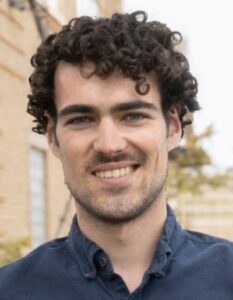In October of 2023, I quit my first sales job. It had taken me four months to learn the job and succeed in my role, only to realize I couldn’t stay. My company’s pitch made me uncomfortable, I hated sitting in a cubicle for eight hours a day, and I couldn’t handle spending each of those eight hours either answering emails or making phone calls. The pivotal moment for me was the realization that I dreaded going into work. If you have experienced this as well, you know it is a vocational death knell. I had no concrete picture of what would be next, but I knew I wanted out.
After three weeks in Peru and a brief spell of substitute teaching, one of my former coworkers alerted me to a nonprofit that had been approved to receive federal grant funds and build a team to resettle refugees. I had a few connections with the organization and was interested in working with clients from around the world. From the age of eight until I turned sixteen, my family lived in the Czech Republic, and I had attended international schools, so I was familiar with and passionate about building community across cultures. Shortly after lunch with the team leads, which I gradually discovered to be an interview, I was hired.
Eager to experience my first airport pickup, I arrived at the Kansas City International Airport early in May of 2024. The family flying in that particular evening was originally from Eritrea, but the three children ranging from four to eight had grown up in neighboring Ethiopia after their home country became too dangerous a place for them to stay. It was April in Kansas City, but the air outside the concourse would still be colder than anything this family had experienced.
When they finally arrived, they looked exhausted from their travels as we waited for their luggage to glide down the carousel. Evidently, the native Tigrinya-speakers had practiced an English phrase or two to prepare for arrival in their new home. After some encouragement from their father, the kids introduced themselves with a “hello, my name is…” and we soon drove the family to the temporary housing we had set up for them. Between a backpack and large duffle bag per person, we loaded up all of their earthly belongings into the back of our fifteen-passenger van. The family members themselves may have weighed as much as their total luggage, which contained (by American standards) barely enough clothes for a week-long trip.
For nine months, my job was to assist newly arrived refugees with our complex system, helping them navigate healthcare, employment, education, housing, and more. The lucky ones arrived from countries such as Afghanistan, Venezuela, Myanmar, or Congo with two full duffel bags per person. One or two of the cases I worked with were so well-off by refugee standards, they even had money when they landed.
The most challenging obstacles could each be broken down into some form of lack. Lack of English, transportation, or technology, to name a few. Despite this, each of the 170+ refugees our team of eight served in those nine months has overcome some or all these barriers.
This past February, however, my time working with them came to an abrupt end, when all federal funding was paused and most refugee resettlement offices were left with no option but to lay off their staff.
Through a connection from my previous job, I transitioned into a new job and now work for a luxury estate sale company in Kansas City where I am training to become an Assistant General Manager.
One month after starting this position, I entered the home where our next project would take place. This particular house was over 7,000 square feet and packed to the brim with items. The bins we filled with women’s shoes alone spread across the king-sized bed in the master bedroom. Even with the bed filled, there were more along the baseboards of the walk-in closet and in the shelving above the clothing racks. Dozens of bags of trash and items for donation take up a corner of the garage as we filtered out items that wouldn’t even make the sale.
After walking into the home, it was hard not to be overwhelmed by the sheer volume of stuff inside. The initial step was staging and pricing, which involved going through seemingly endless drawers, cabinets, and stray boxes. Given the nature of my previous job, I was at first cynical about the utter excess of things. We accumulated dozens of bags of trash and donations that were too low value or in too poor of a condition to sell. Even after filtering these out, we sold over 3,500 items during the three-day sale.
Yet in each new house as I begin sorting through items, it turns personal. At the house I mentioned prior, I discovered bags of new flight attendant uniforms. At another, I glanced through birthday, anniversary, and thank you cards before setting them aside in a closet for personal items. I discover what books our clients read (or at least elect to display), what social groups they were a part of, and which countries’ travel guidebooks had been consulted. And so it went, through rooms of furniture, clothing, spice racks, and tools, my picture of a person or family becoming gradually more distinct.
The whiplash of this transition from refugee resettlement to estate sale management has been startling. Refugees started with nothing after being forced away from their homes to escape severe persecution and hardship. They arrived at their new home in the U.S. with next to nothing but dreams of what a fresh start will provide. Estate sale clients, on the other hand, are dealing with endings in which they must dispense of everything they don’t need. They are either moving away from their old home or managing the estate of a loved one who has passed away.
Despite these discrepancies, I have also noticed a shared commonality that is striking as well. It inspired a limerick:
The bulk of baggage is carried within
A hulk of garbage is brought to a bin
But both bear the cost
Of things they have lost
Here are wealthy and refugee kin
Refugees need to acquire many things: a driver’s license, a car, a job, health insurance, a green card, a bank account, community, English. Skills also need to be acquired: how to use a benefits card and new appliances, how to grocery shop and get around with public transportation (if the acquisition of the car is on hold), who to go to with questions, how to add more data to the cell plan, how to set up payment for rent and utilities, how to enroll in school. The lack in terms of materials and know-how is significant.
On the other hand, estate sale clients are looking to distribute and discard things that are no longer needed. Perhaps a larger house was required for a family of six, but objects continued to fill the space after the kids left, and it has become time to downsize. Maybe the owner simply had disposable income, frequently put it to use, and now must move cross-country. Or sometimes the owner has passed, and responsibility has fallen to another to decide what to do with everything left behind. Regardless, there are many more things in the house than can be kept.
That’s not to say that refugees come with nothing. They may arrive with just a backpack and a carry-on, but we carry more than our things. And in some regards, they carry great excess: suffering, persecution, loss, homesickness, or fear. But also hope, relief, faith, joy, and endurance. Not all excess is bad, after all.
The wealthy have their own challenges. Most wisdom traditions teach us that money only correlates to happiness up to a point. So far, I know very few of the stories of these clients I will be serving, but I can imagine some scenarios that I will come across. A client begrudgingly required to move away from home due to work. A financial emergency forces someone to downsize. Most poignant, a death in a family where relationships are destroyed.
So what do they have in common? One clear commonality here is transition, a transition where what these people can bring with them is limited. Both share burdens and opportunities that all humans face—loss, brokenness, change, life, death, beginnings, endings, hope, despair. We all carry these, but in times of transition, they are heightened. Paradoxically, these two groups will be at their most sensitive and their most courageous during this transition.
Additionally, it’s a vulnerable time. Because both my positions required me to enter into intimate or sensitive times of transition, I have vividly witnessed the excess and lack of others. I’ve learned that if you look closely, you can understand others deeply as your understanding of their excess and lack increases. Do we shape our excess or lack, or does it shape us? You could certainly make a case either way, but this insight remains: what we have and what we don’t are powerful indicators of who we are as individuals, families, or even broader communities. They display what we value and can obtain, but also reveal the limits of what we are capable of gaining or losing. It could be the rolled-up mural the Eritrean father had painted and allocated precious luggage space to keep so he could be reminded of home in his new land. Or the long-forgotten set of china tucked back behind a dozen boxes of holiday decor. A carefully folded I-90 form proving refugee status and proof of legal residence, or the books filled with highlights and notes lining the shelves of a study.
And so the decision for us is this. Will you choose to notice the excess and lack? Will you seek to understand? In either of these jobs, I could have merely fulfilled the requirements of my role and provided the services outlined in the contract. And in many cases, I did no more than that. It is tempting to retreat into the self and view other’s lives through the lens of your own excesses and lacks. Noticing takes more work. It requires open-mindedness and forces us to ask more questions than we might get answers to. It is risky because understanding something new about others may require us to change something in ourselves.
However, I urge you to shrug off ignorance and apathy. When I paid attention to the excesses and lack of others, my work and the relationships I formed through it took on a far greater meaning. In my transition from work with refugees to wealthy homeowners, the stark contrasts of their excess and lack were obvious. But I’m certain that all of us can find similar contrasts in our workplaces or neighborhoods. When we become more fully aware of the constraints of others, we begin to understand their priorities and decisions because we know what they have to work with. We see why the refugee father brought artwork instead of a second pair of shoes. Or discover the box with a dozen years’ worth of Mother’s and Father’s Day cards, handwriting increasing in legibility with each one. You develop empathy. And what is empathy if not the desire to notice, the desire to understand?







1 comment
Brady Quarles
I love this!
Comments are closed.